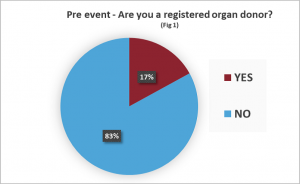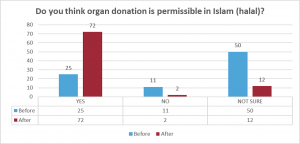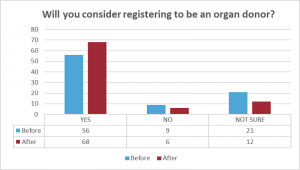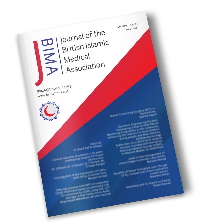
Sameer Ahmed (1) , Omar Ali (2), Ayat Bashir (3), Saeed Ahmed (4), Sharif Al-Ghazal (5), Angus Vincent (6)
1) Specialty Doctor in Anaesthesia, Newcastle upon Tyne Hospitals NHS foundation trust 2) Medical Student, Newcastle University 3) Speciality Trainee in Medicine, Health Education England North East 4) Consultant Nephrologist, South Tyneside and Sunderland NHS foundation trust 5) Consultant Plastic Surgeon, Bradford teaching hospitals NHS foundation trust 6) Consultant Critical Care and Anaesthesia, Newcastle upon Tyne Hospitals NHS foundation trust
Abstract of poster which was presented at the BIMA National Conference , Birmingham 7th December 2019
Introduction
Black, Asian and Minority Ethnic (BAME) groups represent 11% of the UK population but a disproportionate 35% of those waiting on the transplant list (1). 21% of those who died waiting for an organ last year were from BAME background. The statistics suggest that there are not enough donors from the BAME population hence disproportionately high proportion of BAME population suffer longer or die waiting for an organ.
Methods
In view of upcoming change in law about organ donation (2) the British Islamic Medical Association (BIMA) are organising a national campaign to increase awareness about organ donation among the Muslim population to help people make an informed choice. BIMA started the campaign with the first programme as a pilot project which was organised in Newcastle upon Tyne on the 23rd of June 2019 where we invited Islamic scholars, medical experts as well patients who suffered from organ failure to speak and have an open discussion with members of the community to help them make an informed choice(3).
We used a questionnaire to assess the views of the audience before and after the talks.
Results
A total of 86 people completed the questionnaire. 83% (n=70) of whom said that they had not registered to be organ donors and only 17% (n=14) said they were registered organ donors (Figure 1).
Most of the people (50 out of 86) were unsure if organ donation is permissible (halal) in Islam and only 25 of the 86 thought that organ donation is permissible in Islam (Figure 2).
After the programme when the people became more aware by listening to medical experts about the current statistics of organ donation, the process and ethics followed in NHS and the opinion of Islamic scholars 72 out of 86 people came to the conclusion that organ donation is permissible in Islam indicating significant positive shift of 55%.
Only 16% of the people had registered to be organ donors before the event but after the event 79% are convinced and wish to register as organ donors (Fig 3).
Conclusion
Increasing awareness about Organ Donation is a necessity and one of the ways it can addressed is by organising similar awareness programmes in the community. These programmes not only help to educate people about the organ donation process and the ethics followed in the NHS but also helps to make the community aware about the religious opinions of Islamic scholars.
References
- Organ Donation and transplantation data for Black, Asian and Minority Ethnic (BAME) communities report for 2017/2018 https://nhsbtdbe.blob.core.windows.net/umbraco-assets-corp/12048/bame-organ-donation-and-transplantation-data-2017-18.pdf
- https://www.organdonation.nhs.uk/uk-laws/organ-donation-law-in-england/
- Videos from the first Organ Donation awareness programme held at Newcastle upon Tyne on the 23rd of June 2019. https://www.youtube.com/watch?v=8l7KNj-UP6E&list=PL-ihH4ueeoV3nhTTlT3GSoFecdkWCzrks




